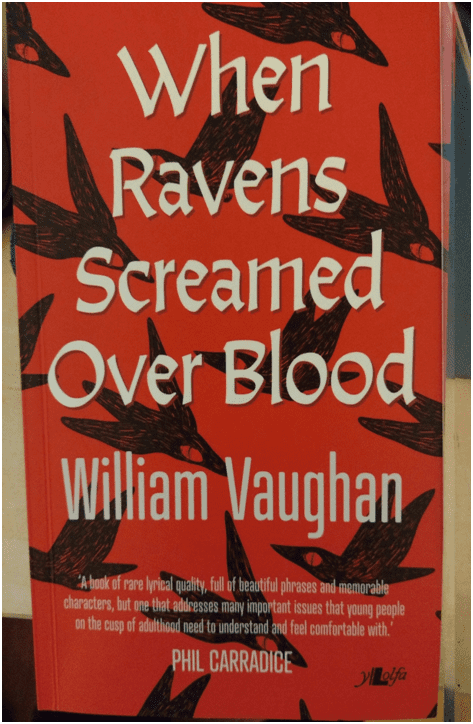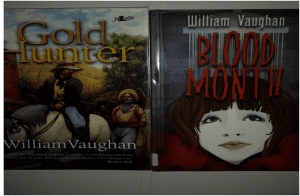On 30th September, 2018, YLolfa Publishers, Tal-Y-Bont, Ceredigion will be issuing a new book to our shops and libraries written by William Vaughan entitled ‘When Ravens Screamed Over Blood.’ The author of four novels for young adults, William Vaughan was born in Cardiff. He became a teacher of History and English and taught both in Cardiff and Leicestershire. He is a member of the Welsh Academy.
Background to the book
‘When Ravens Screamed Over Blood’ is seen as a fantasy narrative. It is written in English and aimed at youths and adults. Phil Carradice explains it ‘addresses many important issues that young people on the cusp of adulthood need to understand and feel comfortable with.’ Carradice is referring to mild sexual encounters within the story, that of man to woman, man to man and of relationships between individual woman to woman. Yet the story is based on the Mabinogion legends and Irish mythology. We meet Rhydian, the perfect Prince of Dyfed who is a handsome, honest and truthful character and thus popular with his people because he never tells lies and never would. But he meets the wrath of Anguish, High King of Achren who demands the Prince owes him a favour and that they should exchange roles, identities and looks and each depart to the other’s kingdom. Adventures follow, that of needing to rescue his sister, Princess Rhiannon from a leering encounter, until Rhydian meets the ghost of a murdered courtier. Love affairs bloom in different ways and when Daire, the friend who follows him to the Celtic Otherworld, they both find they are unaware of an attacking powerful army. Death follows.
I’m Irene Edwards. Hi folk. I’m back again to tell you about this new release. Look out for it from the 30thSeptember when the price will be £4.99 in stores. I have been following the writings of William Vaughan and have read all his books. They are all very different. I decided to hold an interview with him on his new book ‘When Ravens Screamed Over Blood,’ to discover a little bit more about the novella.
The Interview
Irene Edwards… I found your new book ‘When Ravens Screamed Over Blood.’ extremely fascinating as an assembled piece of work encompassing certain records in historical legend. I have come across some references from the Red Book of Hergest and White Book of Rhydderch. You mention The Black Book of Carmarthen and The Tales of the Mabinogion in your introduction also, as in the 3 stanza poetry. But, on the whole, you have tied in Irish exiles with fictional Welsh legend in an imaginary plot which has worked well. What other sources of research helped you in your script, and what percentage of the story was obtained from historical listing and how much from your imagination? What of Irish reference connections?
William Vaughan replies…The central character, Rhydian, is based on Prince Pwyll who exchanged appearances and roles with Arawn, a king of the Otherworld, in the Mabinogion. This was my starting point but, thereafter, I allowed my imagination to take over. Some characters and events also owe a debt to Irish mythology, notably the intervention of the Wee Folk in saving Daire, the Prince of Ulster’s life. The shimmering ghost who comes to the princes’ rescue is, on the other hand, a nod to the Bible where Jesus walks across Lake Galilee to save the disciples. I’m not afraid to borrow good stories!
Irene… Why did you introduce the Romans and crucifixion at the end of the story? Why did you choose to end the plot with the theme of death? Was it because it typified the time in history or was it because the plot was ‘Timeless?’
William Vaughan… Stories for young adults usually have a ‘happy’ ending but the cruelty of prejudice is central to the plot and a more realistic conclusion seemed appropriate to me. Even today, many gay people come to a bad end. The Romans get too good a press from writers, in my opinion. The Celts are portrayed as uncivilised savages in many modern films, for example, and my story tries to redress the balance a little. I also wanted to draw out the similarities between an almost perfect Welsh prince and Jesus, the carpenter from Nazareth.
Irene… It seems a wonderfully worded piece of work with a great deal of poetry in its voice (via that of the phrases used), yet it is written simply and with an innocent voice as it also holds a simple message of romantic truth. How did you plan your story? Did you fully intend to bring a reality into the love scenes and at the same time revert to the intangible Underworld and Magic of a long-ago era?
William Vaughan…The teenage years are a romantic period in life, especially first love. In “Blood Month”, a whodunit for adults, I wrote frankly about sexual matters but, in books for young adults, I avoid anything explicit. Nevertheless, I make it clear that these feelings exist and are important to young people.
Irene… Did you always want to be a writer? When did you begin to write novellas? What other pieces of work have you written?
William Vaughan…I have always liked the idea of writing stories but didn’t complete my first, “The Midnight Ghost”, until I took early retirement from teaching. That was a ghost story for children. I’ve also written “The Black Legion”, a teenage love story set against the French invasion of Pembrokeshire in 1797 and “Gold Hunter,” a story about a Welsh lad who goes to Australia in the 1860s to find gold, only to find more important things instead.
Irene… Perhaps ‘When Ravens Screamed Over Blood’ impressed because you are a History Specialist, but my feelings are that this is your best novella to date. How long did it take you to write it?
William Vaughan…Iam not a professional writer so all my books take a couple of years to write. At least!
Irene… When and where do you work best? Some authors prefer writing at night time when there are no interruptions. Others writers prefer solitude and even write in sheds at the bottom of their gardens. Anywhere away from callers and family ties.
William Vaughan…All my books are hand-written first, often in the garden, in bed or wherever the mood takes me! They are rewritten again and again when on screen. Sometimes writing is like getting blood out of a stone. The trick is to make it read effortlessly.
Irene... By the way, I like the title and book cover. Tell us about the book cover?
William Vaughan… Sion Ilar designed the cover though I suggested a bold approach to the long title! The blood-red cover and simple design works very well, I think.
Irene… Tell us about the book title? Where did you find it and how does it reflect your plot?
William Vaughan…The title is a line from a poem in the “Black Book of Carmarthen”, an ancient Welsh poem.
Morrigan, a Celtic goddess of war, was represented as a raven so it seemed apt to use the bird as an image.
Irene… The three lined stanza at the end of the book re- Rhiannon’s Lament, is a perfect ending to a well-worded composition and is in tandem with the poetry form of The Black Book of Carmarthen…The Verses of the Graves. Did you compose it or quote it from another source?
William Vaughan… Rhiannon’s Lament is mostly my own, but it is in the style and form of ancient Welsh poems and the last line is almost a direct quotation. The original goes: I am alive, they in death! Similar, but not identical.
Irene... Are you presently planning any future projects of literature?
William Vaughan… I began a second DCI Tom Llewellyn whodunit, but I seem to have run out of steam. Maybe it’s my age!
Irene…The work is a colourful and interesting piece of literature and may I be the first to congratulate you on it. I wish you well with ‘When Ravens Screamed Over Blood.’ May it do well with future sales and popularity. Thanks to yourself and also to YLolfa.
William Vaughan…Many thanks for your comments and best wishes.
“When Ravens Screamed Over Blood” is widely available from online bookshops like Amazon, Waterstones and Blackwell’s. Leading bookshops will order copies for collection in stores.ISBN: 978 1 78461 605 2
Other book images by William Vaughan are as follows;
Help keep news FREE for our readers
Supporting your local community newspaper/online news outlet is crucial now more than ever. If you believe in independent journalism, then consider making a valuable contribution by making a one-time or monthly donation. We operate in rural areas where providing unbiased news can be challenging. Read More About Supporting The West Wales Chronicle


























